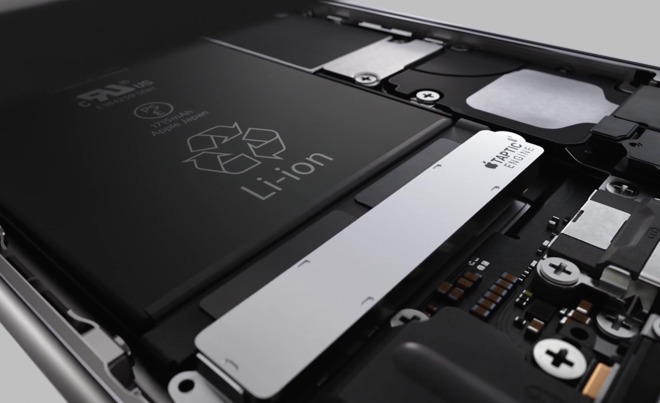At an all-hands employee meeting in January, Apple CEO Tim Cook revealed that some 11 million iPhone batteries were replaced as part of a special 2018 repair program, a figure up to 11 times what the company would have expected under normal circumstances.
According to Daring Fireball's John Gruber, Cook informed employees of the massive uptick in iPhone battery replacements — 11 million versus an anticipated 1-2 million — during an town hall meeting on Jan. 3.
The new information sheds light on Apple's recent revenue guidance revision for the important December quarter. In a note to investors in January, Cook said Apple is anticipating revenue to come in at $84 billion, well below a forecast of between $89 billion and $93 billion issued last November.
While a slowdown in Chinese iPhone sales took the brunt of the blame for the miss, some responsibility was assigned to a weaker than expected hardware upgrade cycle.
"While macroeconomic challenges in some markets were a key contributor to this trend, we believe there are other factors broadly impacting our iPhone performance, including consumers adapting to a world with fewer carrier subsidies, US dollar strength-related price increases, and some customers taking advantage of significantly reduced pricing for iPhone battery replacements [emphasis added]," Cook wrote.
In light of Cook's statement at the all-hands meeting, it appears Apple underestimated the impact of the popular repair program that cut the cost of out-of-warranty battery replacements from $79 to $29. As Gruber points out, while Apple was aware of the increase in replacements over the course of 2018, said program's effect on iPhone sales likely went unrecognized until the annual upgrade cycle of fall 2018.
Apple instituted the replacement program at the end of 2017 in response to revelations that older versions of iOS artificially throttled the performance of iPhones with degraded batteries.
Operating a device with a worn battery can result in shorter running times and, as was the case with certain iPhones, random shutdowns under extreme loads. Apple quietly instituted a performance cap in iOS 10.2.1 to alleviate performance issues and keep older phones operational. Customers were not notified of the change, which led to a major kerfuffle when it was discovered that the peak performance of some iPhones would be artificially reduced under certain situations.
A series of lawsuits and probes by governmental bodies followed.
Apple apologized for what it characterized as a "miscommunication" in a letter to iPhone owners in late 2017. Directly resulting from the so-called "slowdown controversy" were a number of customer-facing initiatives including the creation of battery monitoring software and tools to disable CPU throttling implemented in current versions of iOS. The battery replacement program, which was part of Apple's response, kicked off in January 2018 and ran through December that year.
 Mikey Campbell
Mikey Campbell







-m.jpg)






 Christine McKee
Christine McKee
 Malcolm Owen
Malcolm Owen

 Charles Martin
Charles Martin


 Mike Wuerthele
Mike Wuerthele


-m.jpg)






34 Comments
Is this piece suppose to tell me , 11x more people did exchange battery, and it is Apple's doing good for customers? Or it is because of battery replacement that is hurting sales? And Apple underestimated how popular the repair programme is ?
FOR PETE Sake, there are over 200 million ~iPhone 6 / 6s+ out there, and only 5% did battery swap.
We replaced the battery in my wife's SE at the very end December. In early December the phone shut down unexpectedly triggering the performance throttling protocol even though the battery was only 88% (or possibly 86%, I forget exactly now) worn according to the report in settings. So we took advantage of the reduced pricing (knowing the 2019 price would increase 20€) for the battery swap. We were not ever considering replacing her phone this year as she really does not want a "large" iPhone and the smallest one Apple currently sells in Germany is the iPhone XS.
So for us the reduced price for the battery swap only pulled in the exchange from 2019 to 2018; it didn't push off a phone sale from 2018 to 2019. If Apple comes out with a smaller format phone in 2019, we will buy her a new iPhone even though we just replaced the battery in her SE. I don't think that all (or even most) 9 million extra battery exchanges in 2018 translate to lost new phone sales. However, if we then buy a new phone in 2019 to the casual observer it would look like we did exactly that: postponed our "2018 purchase" to 2019 because we swapped the battery at a reduced cost.
It would be better if Apple kept their mouth shut on this topic, instead of trotting out numbers that can be interpreted negatively in a big way. It is almost as if Apple is sending out an invite to tech media to troll them now.